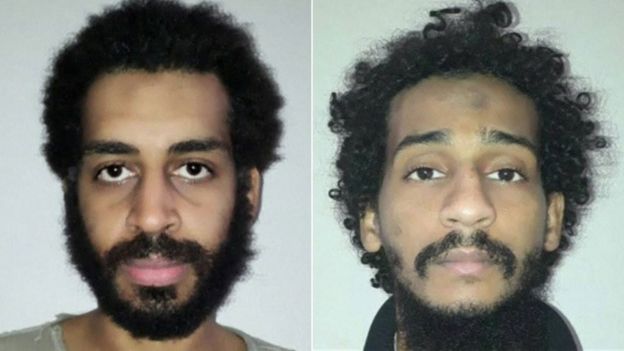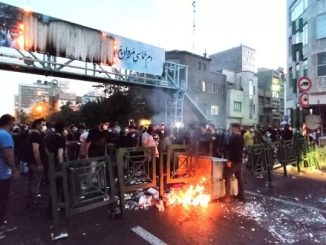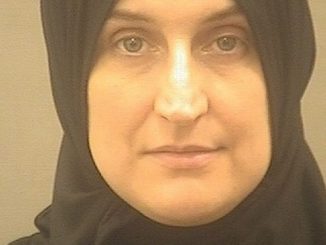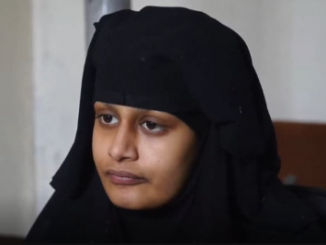
Two Islamic State suspects will not face the death penalty if convicted of the killings of Western hostages in Iraq and Syria, the US has told the UK.
Alexanda Kotey and El Shafee Elsheikh are accused of being the last two members of an IS cell dubbed “The Beatles” because of their UK accents.
The US sought the UK’s help in the case but a legal fight over the use of the death penalty has stymied co-operation.
The US has now made clear the two will not be executed if found guilty.
In a letter to Home Secretary Priti Patel, US Attorney General William Barr said the US authorities would not seek the death penalty against the two men and “if imposed, it will not be carried out”.
In the light of the assurances, he said he hoped the UK would share “important evidence” about the men promptly.
“If we receive the requested evidence and attendant cooperation from the UK, we intend to proceed with a United States prosecution,” he wrote.
“Indeed, it is these unique circumstances that have led me to provide the assurance offered in this letter.”
- What is behind Britain’s IS duo decision?
- Who were the Islamic State group ‘Beatles’ cell?
- Where should the IS ‘Beatles’ be tried?
A Home Office spokesman said the UK “continue to work closely with international partners to ensure that those who have committed crimes in the name of Daesh are brought to justice”.
The pair, who are in US military custody in Iraq, were British citizens, but have been stripped of their UK nationality.
They are alleged to have been members of an IS kidnap gang behind the killings of a number of Western hostages, including American journalists and British aid workers, in Iraq and Syria in 2014.
The victims were beheaded and their deaths filmed and broadcast on social media.
The UK believes the men cannot be legally extradited to the US, but in 2018 it emerged that the US was preparing the ground to prosecute the men – and that it had asked the UK for information that would help convict them.
In response, ministers said they would share intelligence, without opposing a death penalty sentence.
But co-operation with the US was halted after the mother of El Shafee Elsheikh launched a legal challenge, arguing the UK’s position was in breach of its internationally recognised opposition to capital punishment.
Several relatives of the murdered western hostages have said they want the men to face a fair trial, rather than the death penalty.
Diane Foley, whose son James, an American journalist, was murdered by the cell in 2014, said: “I am very hopeful that with this assurance that the death penalty will be waived, that will allow the United Kingdom and United States to pool their evidence so that true justice might be served.”
“I feel that the death penalty is too easy. It allows them to be martyrs… I really feel if they truly have done these horrible crimes, they really need to face life imprisonment, so they have a chance for redemption themselves and a chance to really recognise the horror of what they’ve done to others,” she told BBC Radio 4’s Today programme.
Legal battle
In the past Britain has sought assurances from foreign governments that the death penalty would not be used in cases where the UK provided information or extradited suspects.
The Supreme Court has ruled that the US government’s demand to use crucial evidence from the UK in the case was unlawful.
At the time, the UK said it was “a long-standing position” to oppose the death penalty but added that in this case it was “a priority to make sure that these men face criminal prosecution”.
However, the UK has made clear that if the pair were sent to the controversial US military prison Guantanamo Bay – where suspects have been detained without trial – the UK would withhold intelligence.
The BBC’s security correspondent Frank Gardner said the US was warning that if the issue was not settled by the middle of October, the two men would be handed over to the Iraqi government.
IS once controlled 88,000 sq km (34,000 sq miles) of territory stretching from western Syria to eastern Iraq. It imposed its brutal rule on almost eight million people.
The liberation of that territory control exposed the magnitude of the abuses inflicted on their inhabitants, including summary killings, torture, amputations, ethno-sectarian attacks, rape and sexual slavery imposed on women and girls. Hundreds of mass graves containing the remains of thousands of people have also been discovered.
UN investigators have said IS militants committed acts that may amount to war crimes, crimes against humanity and genocide.
Source: bbc.co.uk






Be the first to comment